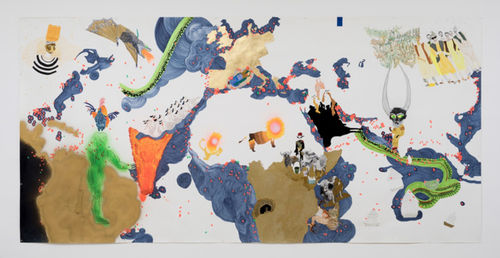From 2015 to 2016, the multidisciplinary artist Elham Rokni asked Sudanese and Eritrean refugees living in Israel to share with her folktales from their home countries. Rokni, who was born in Iran and immigrated to Israel at the age of nine, included eighteen of the aforementioned stories in an artist book entitled “The Iblis, the Girl, the Sultan and the Lion’s Tail.” The tales are presented side by side with
vibrant drawings created by Rokni, offering imaginative visual interpretations of the texts. The folktales from Eritrea and Sudan appear in the book in four languages – in Hebrew and in English, as well as in the storytellers mother tongues: Arabic and Tigrinya.
fictitious elements from the folktales with the all-too-real facts of life as an asylum seeker in Israel. In the video, the artist arrives to the Ministry of interior to assist Khamis, a Sudanese refugee, to renew his visa. As the well-known actor Menashe Noy plays the role of the government official and Khamis tells him that he plays the part of a refugee in Rokni’s film, it is apparent that the encounter is staged. The video combines animation and details from her illustrations, weaving together different aesthetics, materials and storylines into a fragmented collage.
As part of her artistic research, Rokni registered the folktales at the Israel Folktale Archives (IFA) at the University of Haifa. It is disturbing to realize that while the stories from Eritrea and Sudan are safely
documented, the Sudanese and Eritrean refugees – the majority of the asylum seeking communities in Israel – are threatened by deportation to “third party” African countries by the Israeli government. Rokni will refer to the artwork’s conflict with the present state of affairs in a panel discussion which will be hosted by the exhibition’s
curator, Sergio Edelsztein, at the CCA on February 26
(Monday) at 19:00. Alongside Rokni, the artists Ron Amir and Avi Mograbi will share their experience of working with the asylum seekers at the Holot Detention Center.
The exhibition is currently on view at CCA, 2 Tsadok HaCohen street, Tel Aviv, until March 17.
